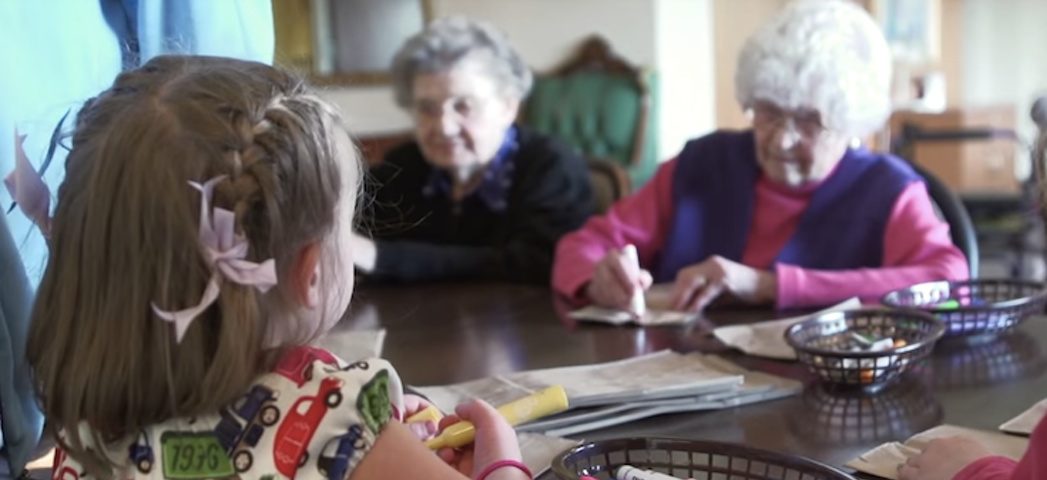This preschool inside a retirement home makes perfect sense for both kids and seniors.


Welcome to the Intergenerational Learning Center, a preschool and nursing home rolled into one.

An older resident helps a little boy button his jacket. All images via “Present Perfect.”
What if you could take all the best things about kids like their honesty, energy, or optimism and all the best things about seniors their stories, patience, and worldly wisdom and put all that magic in the same room?
That’s exactly the thinking behind the Intergenerational Learning Center in Seattle, Washington.
The ILC sits inside Providence Mount St. Vincent, which is home to over 400 permanent senior citizen residents. In addition to the seniors, 125 young children attend preschool there, their days filled with art classes, music, and more.
What’s makes the ILC different is that a few times a day, the seniors and the kids get together for joint exercise, storytelling sessions, lunch, and more.
And the results are absolutely amazing. For everyone.
Spending time with kids is great for seniors physically and mentally.

The seniors and kids interact every day, whether they’re exercising, doing crafts, or just hanging out.
Long-term senior care can sometimes be pretty bleak. According to the Centers for Disease Control and Prevention, about 80% of older adults have at least one chronic health condition, which can lead to high levels of depression. A 2009 study estimated as many as about 28% of seniors in nursing homes take antidepressants for either major or minor depression.
Intergenerational-care groups have found that older adults who are able to spend time with children enjoy better emotional, mental, and physical health. Some say that those seniors wind up burning more calories and performing better on memory function tests when they spend time with children, too.
Putting aside the science and the research mumbo jumbo, you can see all you need to see in these seniors’ smiles.

You’re never too old to enjoy the parachute game.
Being around seniors is good for the kids, too.
 it was the best.
it was the best.
It’s great that this program is a positive thing for Providence Mount St. Vincent’s seniors, but if it weren’t a good thing for the children, too, the program wouldn’t have lasted long.
And that’s where the beauty of the ILC really lies.
While the kids are dancing, playing, or even just talking with the seniors, they’re learning things like patience and acceptance. Some research actually shows that children in programs like this one go on to show better academic performance and stronger social maturity later on in life.

The seniors are good companions, and they’re great at silly hand games, too.
Again, though, if we look beyond the research and the developmental advantages, we see these natural, intergenerational friendships just make sense.
The ILC isn’t the only program in the country that’s finding new ways for different generations to learn from each other.
Seattle’s Intergenerational Learning Center was the subject of a recent documentary called “Present Perfect,” which is getting a lot of attention. In the years since the ILC opened in 1991, roughly 500 programs like it have popped up all over the country.
Hopefully, with the film’s release slated for sometime next year, we’ll see even more support for this innovative approach to education and healthcare.
